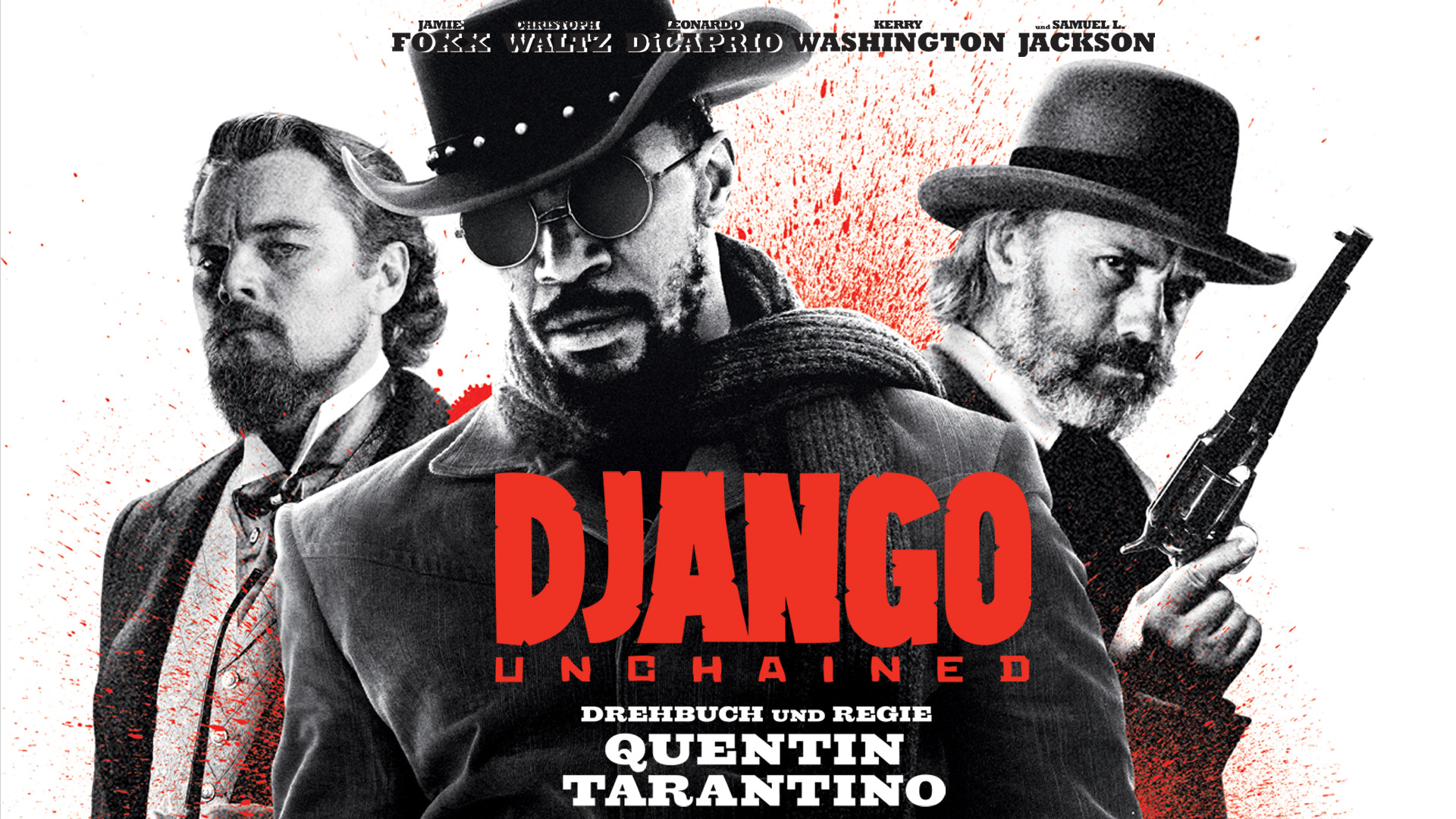Django Unchained (2012)

“Django Unchained,” released in 2012, is a groundbreaking American Western film written and directed by Quentin Tarantino. Known for his distinctive style and sharp dialogue, Tarantino infuses this film with themes of revenge, freedom, and morality, while also addressing the harsh realities of slavery in America. Featuring a stellar cast including Jamie Foxx, Christoph Waltz, Leonardo DiCaprio, Kerry Washington, and Samuel L. Jackson, “Django Unchained” stands out as a provocative and entertaining exploration of the Western genre.
The story follows Django, played by Jamie Foxx, a former slave who is freed by Dr. King Schultz, a German bounty hunter portrayed by Christoph Waltz. Schultz needs Django’s help to identify a group of outlaws known as the Brittle Brothers, and in return, he promises to help Django rescue his wife, Broomhilda (Kerry Washington), who remains enslaved on a brutal plantation owned by Calvin Candie (Leonardo DiCaprio). This setup not only sets the stage for a classic revenge narrative but also provides a platform for deeper discussions about race, power, and humanity.
From the outset, “Django Unchained” immerses viewers in a richly detailed world. The film’s cinematography, helmed by Robert Richardson, captures the vast landscapes of the American South and the rugged beauty of the Western frontier. Tarantino’s use of vibrant colors and striking imagery enhances the film’s visual appeal, creating an engaging backdrop for Django’s journey. The attention to detail in the production design, from the costumes to the settings, adds authenticity to the portrayal of the era.
A central theme of the film is the quest for freedom and self-identity. Django’s transformation from a slave to a confident bounty hunter is both empowering and symbolic. Jamie Foxx delivers a powerful performance, embodying Django’s determination and resilience as he navigates a world filled with violence and oppression. His character arc resonates deeply, illustrating the struggle for agency in a society that seeks to dehumanize him. As Django becomes more skilled and confident, he also confronts the brutality of the system that enslaved him, culminating in a series of explosive confrontations that are both cathartic and thrilling.
Christoph Waltz’s portrayal of Dr. King Schultz adds depth to the narrative. Schultz is a complex character—intelligent, witty, and morally ambiguous. His relationship with Django evolves from a mere business arrangement to a genuine partnership, as he respects Django’s intelligence and capabilities. Waltz’s performance earned him an Academy Award for Best Supporting Actor, and his chemistry with Foxx is one of the film’s highlights. Their dynamic exemplifies the themes of camaraderie and mutual respect that can emerge even in the most oppressive circumstances.

Leonardo DiCaprio’s portrayal of Calvin Candie is nothing short of chilling. As the owner of Candyland, a lavish plantation, Candie embodies the cruelty and entitlement of the era’s slave owners. DiCaprio delivers a haunting performance that reveals the depths of his character’s sadism and moral depravity. The infamous dinner scene, where Django and Schultz confront Candie, is a masterclass in tension and psychological warfare. DiCaprio’s ability to oscillate between charm and menace creates a truly memorable antagonist that drives the narrative forward.

Kerry Washington’s role as Broomhilda is crucial to the emotional core of the film. While her character has limited screen time, Washington’s performance conveys the pain and resilience of enslaved women. Broomhilda represents both Django’s motivation and the broader struggles of those who suffered under slavery. The film thoughtfully depicts her plight, reminding viewers of the human cost of the historical context in which the story unfolds.
Samuel L. Jackson’s portrayal of Stephen, Candie’s loyal house slave, adds another layer of complexity to the film. As a character deeply embedded in the system of oppression, Stephen’s cunning and manipulative nature provides a stark contrast to Django’s quest for liberation. Jackson’s performance is both humorous and unsettling, challenging viewers to confront the complexities of loyalty and betrayal within the context of slavery.

The film’s dialogue is characteristically Tarantino, filled with sharp wit and memorable one-liners that elevate the narrative. The script deftly balances moments of tension with humor, providing a captivating viewing experience. The anachronistic use of modern music throughout the film, including tracks from contemporary artists, adds a unique flair that enhances the storytelling and keeps audiences engaged.
“Django Unchained” is not without controversy, particularly regarding its depiction of violence and the use of racial slurs. However, Tarantino’s intention seems to be to provoke discussion rather than to glorify violence. The film confronts the brutal realities of slavery head-on, using its graphic depictions to challenge viewers to engage with America’s complex racial history. It serves as a commentary on the past while also reflecting contemporary issues of race and power.

In conclusion, “Django Unchained” is a bold and thought-provoking entry into the Western genre that combines action, drama, and social commentary. Quentin Tarantino’s masterful direction and writing, coupled with strong performances from a talented cast, create a film that is both entertaining and deeply impactful. The story of Django’s quest for freedom resonates on multiple levels, offering insights into the human condition and the fight against oppression. With its rich character development, stunning visuals, and sharp dialogue, “Django Unchained” remains a significant cinematic achievement that challenges audiences to reflect on the complexities of history, race, and identity.
Suggested videos for you:
S.W.A.T Under: The Untold Escape
Suggested videos for you:
What Happens When Apes with Superior Intelligence Rule Earth? | Kingdom of the Planet of the Apes
Suggested videos for you:











